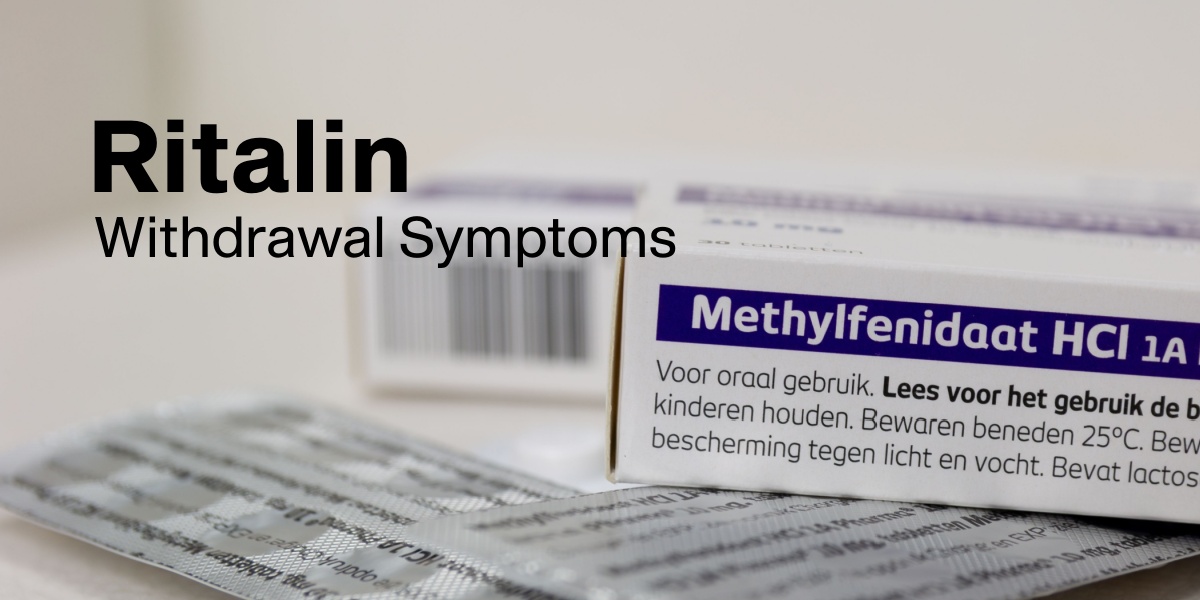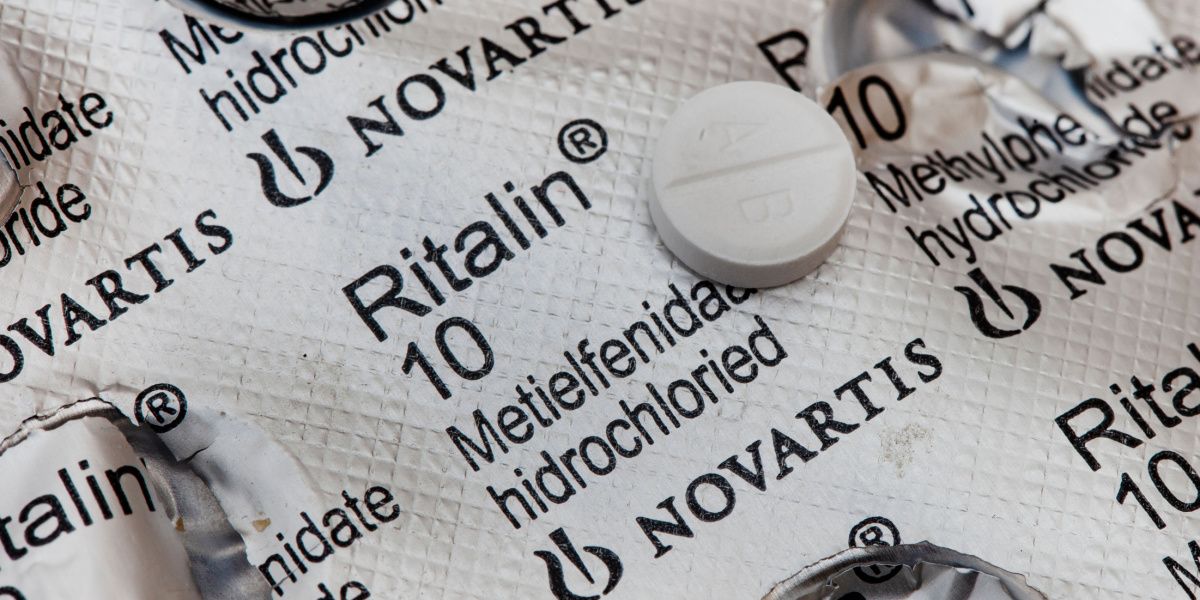Ritalin is a central nervous system (CNS) stimulant medication containing methylphenidate. It is used to treat ADHD and narcolepsy and is available in varying strengths, as an immediate-release tablet and extended-release capsule. [1][2]
Methylphenidate is a Schedule II controlled substance, because of its dependence and abuse potential. Ritalin is sometimes abused for its stimulant and euphoric effects and may cause withdrawal symptoms when use is stopped, particularly if it is stopped abruptly after prolonged or heavy use. [3]
- Ritalin withdrawal can lead to psychological and physical symptoms, especially after prolonged use or abuse.
- Symptoms may include fatigue, mood changes, and cravings, typically peaking within 7-10 days.
- Gradually tapering Ritalin under medical supervision is recommended to avoid severe withdrawal effects

Does Ritalin cause withdrawal symptoms?
Some individuals who are prescribed Ritalin are advised to take breaks in their treatment to determine the effectiveness of their medication, during which time they may or may not experience withdrawal symptoms, depending on the duration of treatment and dose. However, prolonged or heavy Ritalin use or abuse is more likely to cause withdrawal symptoms upon discontinuation. [1]
When stopping Ritalin use, whether prescribed or illicit, it is recommended to seek professional advice and gradually reduce the dosage, as withdrawal symptoms may occur. Ritalin withdrawal symptoms can range from mild to severe and may have an extreme psychological impact. [4]
The risk of withdrawal symptoms may be increased if Ritalin is abused by taking larger doses than prescribed or administering the substance in unintended ways, such as intranasally or intravenously. Ritalin is commonly abused for its stimulant and euphoric effects and is used to enhance academic or athletic performance. [5][6]
Ritalin use can lead to the development of tolerance and dependence, which can increase the risk of abuse and lead to the use of larger or more frequent doses, thereby increasing the risk of withdrawal symptoms upon cessation or reduction. Ritalin impacts dopamine and norepinephrine levels. Once dependence develops, the body must learn to adapt to changes in neurotransmitter levels when use is stopped, which causes physical and emotional withdrawal symptoms. [4]
Ritalin withdrawal symptoms
Some people might not experience withdrawal symptoms when stopping Ritalin use, while others may experience mild to severe withdrawal symptoms. Common Ritalin withdrawal symptoms following heavy or prolonged use can include: [1][5][7]
- Fatigue
- Insomnia
- Drowsiness
- Anxiety
- Low mood
- Irritability
- Concentration impairments
- Increase in appetite and weight
- Paranoia
- Cravings
Typically, Ritalin does not cause severe withdrawal symptoms. However, discontinuing heavy Ritalin use may result in severe psychological symptoms, such as: [4][5]
- Severe depression and anxiety
- Suicidal thoughts or attempts
- Psychotic symptoms, such as hallucinations, delusions, or paranoia
Ritalin withdrawal timeline
When reducing or stopping Ritalin, some people may not experience any withdrawal symptoms. Typically, those who use high doses of Ritalin will be more likely to experience withdrawal symptoms, being more severe the higher the dose. [5]
Generally, withdrawal symptoms will begin within a few days of abstinence, although this can vary depending on the type of Ritalin used. For example, extended-release Ritalin is long-acting, so withdrawal symptoms may not emerge as quickly as with short-acting Ritalin. [4]
Withdrawal symptoms may be at their most severe within the first 7-10 days and often will begin to reduce after this time. Some people experience withdrawal symptoms for several weeks. Following heavy and prolonged use, they can last for several months. The most persistent withdrawal symptoms are often related to mood changes, including anxiety and depression. [4][5]
Ritalin cessation timeline
Individuals using Ritalin as prescribed might be advised to take breaks from their medication, which will involve occasionally stopping use altogether to determine if it is needed. For some people, particularly those who have used Ritalin for a long time, are abusing the medication, or have a substance use disorder, it may be necessary to gradually taper off the medication to reduce withdrawal symptoms. [1][7]
As such, a cessation timeline will differ from person to person and depend on the amount and duration of their use. Often, it is recommended to make small dosage reductions every few days to weeks. This should be done with professional advice and monitoring. Cessation can be paused or slowed to allow for withdrawal symptoms to be alleviated. [7]
Is Ritalin safe to withdraw from at home?
In many cases, it is safe to withdraw from Ritalin at home, as withdrawal symptoms are unlikely to occur with prescribed and short-term use. However, those who have misused or abused Ritalin in large doses or for prolonged periods should not withdraw at home without professional input, as they may be at risk of physical or psychological effects that require treatment. [1][4]
It is always recommended to seek professional advice before reducing or stopping Ritalin use, regardless of the dose and duration. Those wishing to remain at home during detox may be advised to utilize outpatient services, where they can receive professional monitoring and treatment for any withdrawal symptoms that occur. [7]
It is common for people stopping Ritalin to experience mood changes, with some experiencing suicidal ideation. For this reason, it can be beneficial to advise family and friends of Ritalin withdrawal, as they can provide support and help recognize any concerning changes in mood and/or behavior that may require professional intervention. [4]
Ritalin detox treatment
Individuals who are prescribed Ritalin will likely receive regular medication reviews with their prescribing doctor. They can provide advice on when it is safe and appropriate to reduce or stop treatment while monitoring and treating any withdrawal symptoms that occur. [1]
Individuals with Ritalin dependence or addiction may require treatment from specialized services that can provide medicinal or therapeutic interventions during detox. This might include an inpatient service, such as a rehab center, where professionals can consistently monitor and treat withdrawal symptoms while providing additional mental and physical health care. [7]
Treatment during Ritalin detox might include: [4][5][7]
- Therapies: Often, the detox process is improved by utilizing psychological and psychosocial therapies, including cognitive behavioral therapy (CBT) and group therapies such as support groups and 12-step programs. These interventions can commence during detox and continue throughout the recovery process.
- Medications: There are no medications approved specifically for Ritalin detox, although certain medications may be helpful as a short-term treatment during the detox process. For example, antidepressants and benzodiazepines may be used to reduce withdrawal symptoms such as depression, anxiety, and insomnia.
- Holistic care: Substance use disorders often impact several aspects of an individual’s health and well-being. Holistic therapies, such as mindfulness, yoga, meditation, nutrition counseling, and creative therapies, can help to improve general health and be beneficial during detox and ongoing recovery.


-guide-detail.jpg?v=1722503424)
